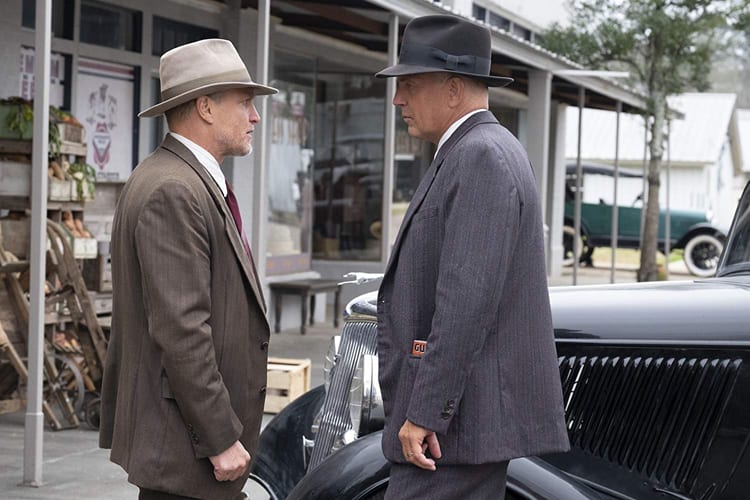I recently had the opportunity to sit down with John Lee Hancock and John Fusco, the director and writer of The Highwaymen. Their new movie tells the story of Frank Hamer and Maney Gault, the Texas Rangers who caught and killed notorious criminal duo Bonnie and Clyde. The following interview is an abridged version of our conversation. The Highwaymen is available to stream on Netflix beginning March 29.
***
Ryan Bordow: Your film deals closely with sensationalizing violence. You show how newspaper reports on Bonnie and Clyde’s escapades were helping make them into small-town heroes. Unless I’m reading your movie wrong, the movie implicitly condemns this sensationalizing of Bonnie and Clyde’s violence.
John Lee Hancock: [nods in approval]
Ryan Bordow: The movie also touches on how these men [Frank Hamer and Maney Gault] are also murderers—they’ve done some pretty terrible, bloody things. There’s a moment in the film where Hamer rejects an interview with the newspaper about their killing of Bonnie and Clyde. But now you’ve made a movie about him. Do you think that this film runs the risk of sensationalizing the violence that Hamer and Gault carried out?
JLH: It doesn’t bother me. One, I would take exception to calling them murderers, because if you’re an officer of the law and there’s a person shooting you and you shoot them, that doesn’t come into the definition legally of murder.
John Fusco: They were manhunters.
JLH: Yeah. They were manhunters, they’re going after a bad guy, and the bad guy has—you know, you could go case by case with a hundred different files, and maybe find something—I’m not disagreeing ‘cause I’m not a historian. But I think calling them murderers is a hundred percent incorrect.
RB: I was referring to—
JLH: Legally.
RB: Well yeah, legally. I was referring to the story of how Hamer and Gault broke into a place and shot a bunch of people before they could put their hands up. Some might see that as unethical, as more murder than justice.
JLH: I would go with it being unethical, and certainly a grey area. Do they come to this story without flaws, without demons, without their own stuff? No they don’t. They’re not perfect human beings, and I think that’s part of their journey, this stuff that they regret. That’s what the story is about: the burden you carry with that terrible gift. So I would agree that yes, these aren’t completely righteous men doing the right thing; they are doing what they think is necessary. Even the governor thinks that their style of doing things is not PC [politically correct], even though that wasn’t a term in 1934.
JF: It’s a really thoughtful question.
JLH: Yeah, it is.
JF: I think—for two years, Barrow and Parker [Clyde and Bonnie] were out there killing. The law tried to do legal roadblocks and get them to surrender, because there was a woman with them; there was a girl with them. These law officers were killed. They had three thousand rounds of armor piercing ammunition in their car.
JLH: When they found it.
JF: Yeah. They had three Browning automatic rifles fully loaded, ten Colt automatic pistols, three loaded shotguns, other handguns—they had to be stopped. But it is interesting, because Hamer was a humble, quiet guy who did not want to talk about this stuff. He turned down Tom Mix for a movie offer; he turned down ten thousand dollars for a book deal.
JLH: And I think the reason—I mean, I don’t know this to be true, but in my heart and mind, I think the reason that Hamer took on the job was because it galled him. I think [Bonnie and Clyde] were more than small-town heroes: they were national heroes and in international press. I think it galled him that people were being made famous for things they should be ashamed of. He was an old school guy. And maybe he had an old-fashioned sense of right and wrong, but I think that’s who Frank Hamer was. Did he always do right? Nope. The whole thing’s an ugly enterprise.
RB: What were you intending to convey by depicting the poverty of the townspeople who idolized Bonnie and Clyde?
JLH: I think that the townspeople gave [Bonnie and Clyde] a little bit of a pass because hatred was so great for the banks. That was the overriding feeling: the farms, your stores, your houses, the banks are taking them all. Everybody’s hurting. They want [Bonnie and Clyde] to be Robin Hood. You need a hero when you’re in that deep, dark place, you want somebody who’s gonna strike out at The Man.
JF: I think that the ‘lovers on the run’ element really appealed to the people, and Bonnie and Clyde played into it. They saw this, and they were acting out a sick fantasy of being movie stars: Bonnie wanted to be a Broadway star and Clyde wanted to be a famous musician. It was almost like, “if we can’t be famous, we’re gonna be notorious.” They were very aware; they were branding before branding.
JLH: [The townspeople] were willing to overlook part of it. Initially, [Bonnie and Clyde] only killed police officers, and I think police were grouped in with The Man. Actually, I love when you talk about why they were in the press: all anybody wanted to read was—
JF: Newspaper circulation was plummeting during The Depression. Newspapers were going under. People did not want to read about depressing economic news. They were interested in three things: sports heroes, movie stars, and flashy gangsters.
RB: If it bleeds, it leads.
Both: Yeah.
JF: That’s what was getting the ink, and so Bonnie and Clyde really played into that. Bonnie always referred to “her public”. It’s incredible—it’s really an incredible story.
Facilitator: That wraps it up.
JF: Good questions.
JLH: Great questions. Nice to meet you!




